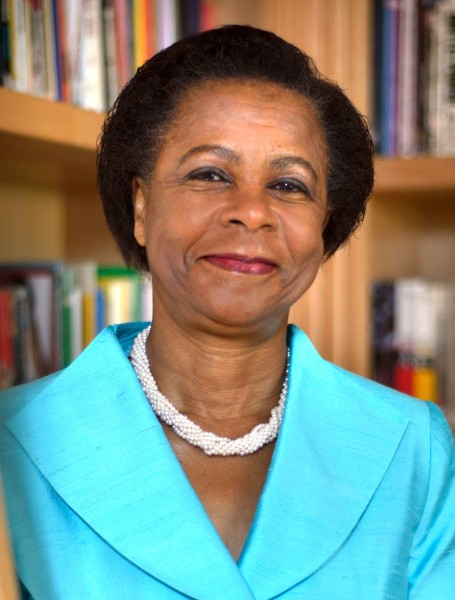Share post now

global
The Alliance Sud magazine analyses and comments on Switzerland's foreign and development policies. "global" is published four times a year (in german and french) and can be subscribed to free of charge.
Global, Opinion
01.10.2021, International cooperation
The world is jaded by the multiple planetary emergencies upon us. These emergencies are compounded by the widespread failure of leadership at both the public and private sector levels.

Co-President of the Club of Rome and Co-Founder of Reimagine SA.
© Mamphela Ramphele
Scientific knowledge is proving inadequate to the task of getting humanity to reimagine new ways of being human. Reimagination requires going deep into oneself. Such reimagination demands of us to be prepared to unlearn our extractive value systems and learn anew from nature that we are part of an interconnected and interdepended web of life. As indigenous cultures across the world teach us – we have to become indigenous again and function within the rhythm of nature’s wisdom. Becoming indigenous again would enable humanity to emerge from these emergencies with a new human civilization – one in harmony with nature.
Young people all over the world are slowly but surely rising to the challenge of leadership in the face of the failures of their parents and leaders. Global movements such as Fridays for the Future, Extinction Rebellion, Rainbow Warriors, and Avaaz have taken it upon themselves to shape the future they desperately wish to see emerge.
Young people in Africa are also rising to the opportunities of embracing the wisdom of their ancestors. Africa’s wisdom is that it is a land of abundance – there is enough for all if we share equitably. The value system of Ubuntu enables all to share in the prosperity generated through collaborative work. There are no free riders in Ubuntu.
A significant proportion of the more than 600 million 15-49 year old Africans, are building innovative solutions to address the multiple challenges they face across a multiplicity of contexts. They are turning scarcity of provision of old technologies in telecommunications and financial services, into opportunities to create abundance. Cell phones and online financial services are leveraging the estimated annual flows of remittances (estimated at 44bn USD) to establish cheaper and more reliable connectedness between the diaspora and the home base.
Africa is also slowly dismantling the colonial education models that have held her youthful population hostage to education systems that alienate them from their rich cultural heritage. Colonial education models have mentally enslaved Africans for generations, making many to continue to believe in white supremacy and black inferiority. It is this mental slavery that continues to undermine Africa’s ability to leverage its abundance to generate shared prosperity.
We are witnessing the creation of new education models such as the seventeen year old Leap Math and Science Schools in South Africa, that are helping young people to free themselves from this mental slavery and to embrace the wisdom of Ubuntu. The healing impact of interconnectedness and interdependence results in self-confidence and restored dignity and self-respect. The outcomes are spectacular in the poorest most broken slum areas of South Africa from which they come. Leap graduates become leaders in their broken communities as teachers, engineers, civil society, political actors and many other professionals. These outcomes belie the poverty the world sees in Africa. Young people see abundance, and are the abundance of Africa.
Africa as the largest continent (landmass equal to Europe, China and USA combined) with the largest resource base (60% arable land; 90% of mineral deposits, sun and rain in abundance; and the most youthful population of 1,4bn) needs to find a new development model. Such a model has to be framed within the Ubuntu philosophy to leverage this rich resource base through collective action that unleashes the talents and creativity of its youthful population.
The world stands to gain from an Africa pursuing a more sustainable regenerative socio-economic development model. Such an Africa would be able to share its abundance in a more equitable way. Africa’s youthful population, freed from mental slavery and affirmed as innovative energetic global citizens, would provide the critical skills and creativity that the rest of the aging global community would need. The world needs to co-invest with Africa in an accelerated regenerative socio-economic development that leverages Africa’s land mass for food security. Drawing on Africa’s indigenous knowledge of organic agriculture and her rich marine food systems would ensure secure healthy food for all.
Africa’s minerals that are fuelling the world economy, including the newfound rare earths essential for electronics, need to be mined in a sustainable way. Extractive mining practices are not only damaging the African landscapes, but undermining the wellbeing of her people. Sustainability of the flow of the benefits of mineral wealth for the entire global community requires radical transformation from extractive approaches to regenerative ones.
The world need to seize the COVID pandemic and climate change existential crises as opportunities to learn anew how to work together as a global community. This would ensure that we shift from degenerative approaches to regenerative ones that promote sustainable wellbeing for all. This entails changing excessive consumption patterns to wiser choices to enable us stay within planetary boundaries. It also entails that we embrace nature’s wisdom that there can be no Me without We. Humanity is inextricably interconnected and interdependent.
My reimagined Africa in 50 years’ time is that of a continent that has reclaimed her heritage as the cradle of humanity and of the first human civilization, modelling nature’s intelligence to ensure that everyone contributes their best to the wellbeing of all in the entire ecosystem. Africa would then offer the world a model of how to learn anew to become fully human.
Share post now

global
The Alliance Sud magazine analyses and comments on Switzerland's foreign and development policies. "global" is published four times a year (in german and french) and can be subscribed to free of charge.